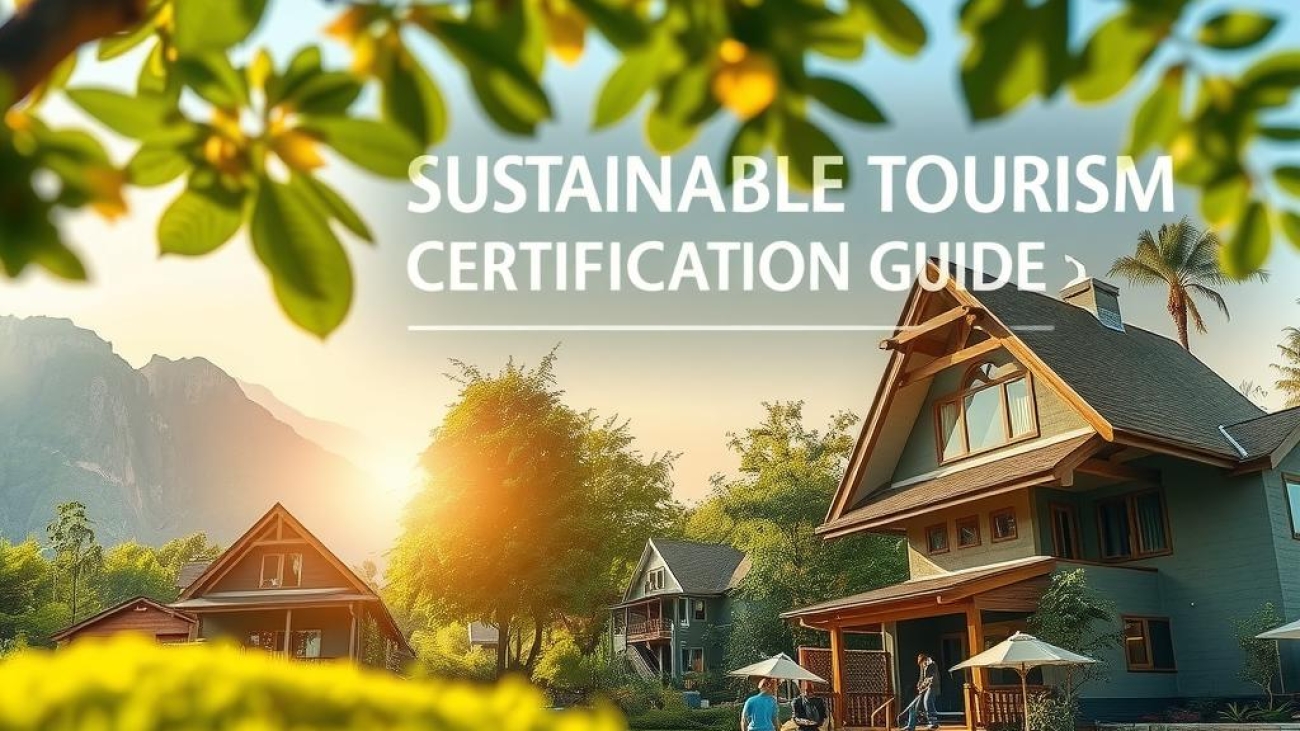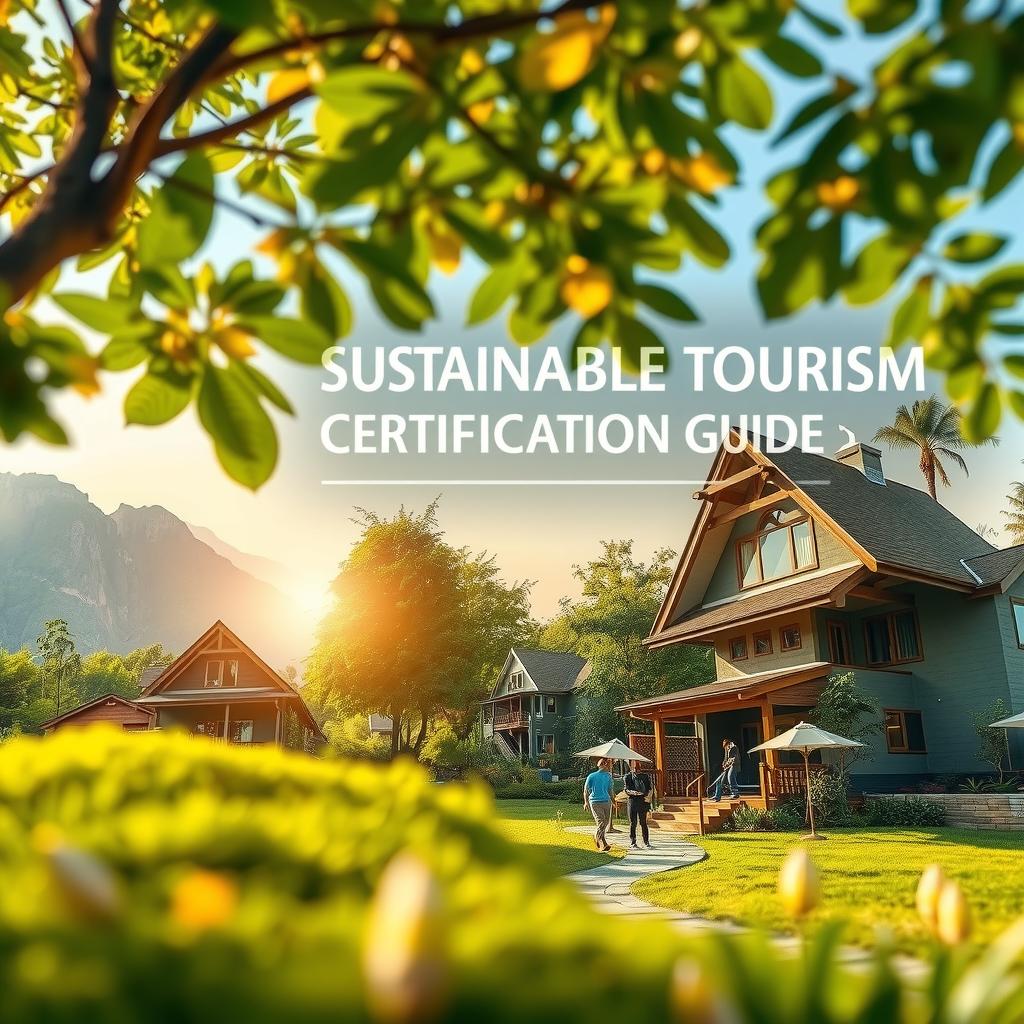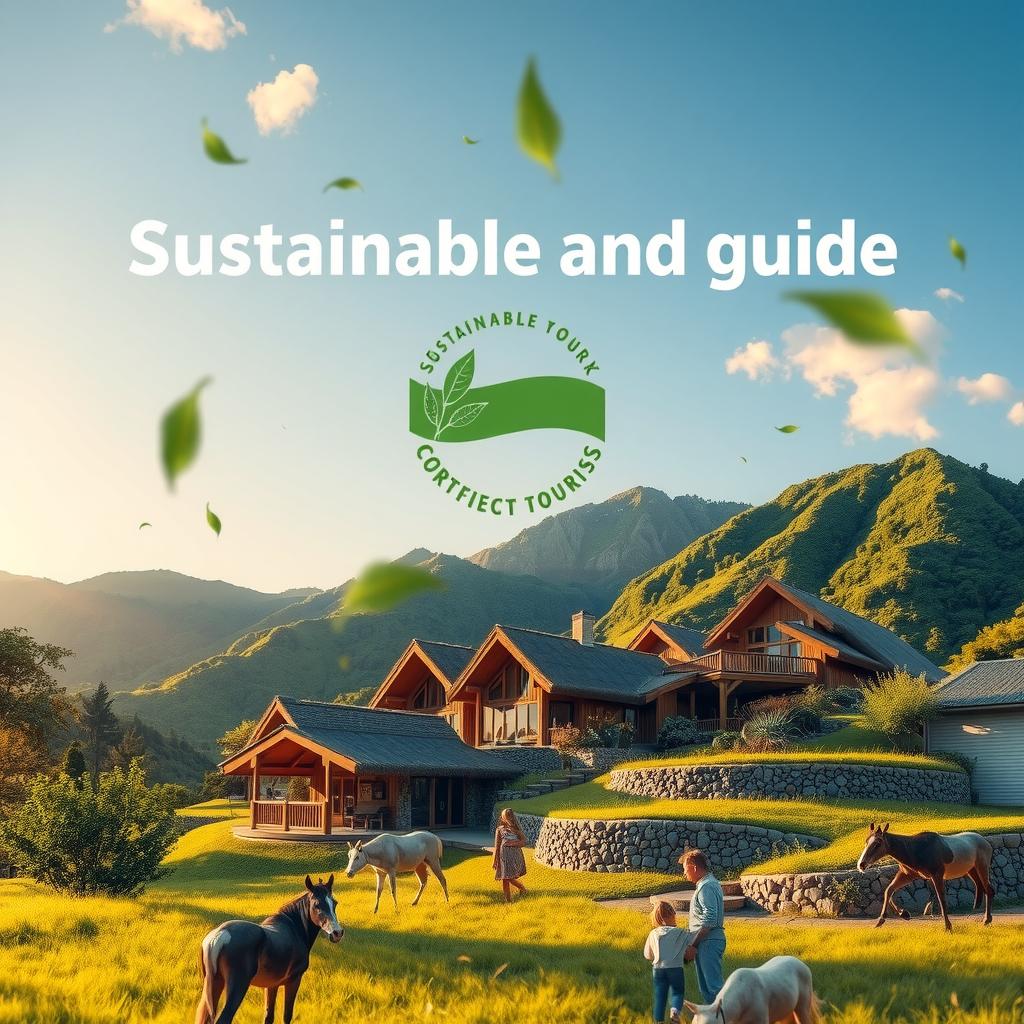In an era where climate change and environmental degradation are pressing global issues, the travel industry faces increasing scrutiny regarding its impact on nature and local communities. With rising concerns about overtourism, pollution, and wildlife conservation, many travelers are seeking ways to make their adventures more conscientious and eco-friendly. This shift in mindset has led to a growing interest in sustainable travel practices, prompting tourists to explore options that align with their values of responsibility towards the planet. Enter sustainable travel certification programs, which serve as essential tools for discerning eco-conscious travelers who wish to ensure that their journeys contribute positively rather than negatively.
These certification programs offer a valuable framework for understanding how different destinations operate in terms of sustainability. By obtaining green certifications, various tourism providers demonstrate their commitment to ethical practices that minimize environmental impact while promoting social equity within local communities. Travelers can now choose accommodations or tour operators boasting recognized certifications such as Green Globe or EarthCheck—signifying adherence to strict standards of ecological preservation and responsible tourism. Thus, these programs not only guide tourists toward making informed choices but also encourage businesses within the industry to adopt sustainable tourism practices.
The core value embedded in these initiatives is transparency; they help bridge the gap between consumers’ desire for adventure and responsibility towards our planet’s well-being. By participating in certified experiences, individuals can actively support efforts aimed at preserving natural resources while enjoying immersive cultural encounters during their travels. Furthermore, engaging with environmentally conscious vendors fosters economic growth within host communities—ensuring that tourist dollars contribute directly towards sustaining vibrant ecosystems.
As travelers embark on this journey toward greater awareness of their choices’ implications on nature and society alike, understanding available certification programs becomes paramount. From assessing carbon footprints associated with transportation options to evaluating waste management strategies employed by hotels or attractions—the decision-making process is enriched by these credible endorsements of sustainability competency.
Ultimately, embracing sustainable travel through accredited certification frameworks empowers individuals not just as vacationers but also as stewards of our environment—a crucial step forward in mitigating adverse impacts associated with traditional tourism models. In this blog post, we will delve deeper into notable sustainable travel certification programs, exploring what sets them apart while revealing how they enable tourists across the globe to leave a positive legacy wherever they roam.

Key Points:
-
Understanding Sustainable Travel Certification Programs: A Guide for Eco-Conscious Tourists
Sustainable travel certification programs play a pivotal role in guiding eco-conscious tourists toward making responsible choices. These programs evaluate and recognize establishments that adhere to environmentally friendly practices, ensuring travelers can enjoy their adventures while minimizing their environmental impact. By becoming familiar with these certifications, tourists can navigate the complexities of eco-friendly tourism more effectively. -
The Importance of Responsible Travel Choices: Supporting Sustainable Tourism Practices
Incorporating sustainable travel certification programs into travel planning encourages responsible travel decisions. When travelers opt for certified accommodations, tour operators, or transportation services, they actively contribute to promoting tourist sustainability and supporting local economies. These initiatives not only highlight businesses committed to sustainable practices but also educate consumers on how their choices influence the broader goals of sustainability within the tourism sector. -
Empowering Travelers as Environmental Stewards: The Role of Green Certification
Embracing green certifications signifies a commitment to fostering sustainable tourism practices worldwide. Through sustainable travel certification programs, travelers empower themselves as stewards of the environment by engaging in activities that prioritize resource conservation and community involvement. This conscious approach enhances one’s experience while exploring new destinations responsibly, ultimately benefiting both the traveler and the planet alike through enhanced awareness and participation in responsible travel initiatives.
The Role of Certifications in Sustainable Travel
Promoting Responsible Tourism Through Eco-Friendly Choices
In an era where climate change and environmental degradation are pressing concerns, the importance of sustainable travel certifications cannot be overstated. These certification programs play a pivotal role in guiding travelers toward more responsible choices, ensuring that their adventures contribute positively to both local economies and ecosystems. By opting for accommodations or tour operators that have received recognized green certification, tourists can actively support businesses committed to sustainable practices. Such practices may include reducing carbon footprints through energy efficiency measures, minimizing waste by implementing recycling programs, and supporting local communities through fair trade initiatives. One prominent example is the Green Key program, which encourages hotels and other lodging facilities to adopt eco-friendly methods while providing travelers with assurance regarding their environmental impact.
Understanding the Impact of Eco-Friendly Practices
Enhancing Tourist Sustainability Through Certification
The relationship between tourism and environmental conservation is complex; however, it becomes clearer when one considers how sustainable travel certification programs function as benchmarks for best practices within the industry. Programs like EarthCheck not only evaluate operational aspects but also emphasize community engagement and cultural preservation—key components essential for maintaining long-term tourist sustainability. For instance, a certified location might prioritize preserving natural habitats while educating visitors on heritage conservation efforts—creating a meaningful experience that fosters respect for nature among travelers. This dual focus ensures that tourism does not merely exploit resources but rather operates harmoniously with them. Moreover, statistics show that destinations marked by such certifications often report higher satisfaction rates among visitors who value sustainability.
Building Awareness: The Importance of Certification in Travel Decisions
Encouraging Travelers to Make Informed Choices
Awareness surrounding travel certifications has grown significantly over recent years due to increased consumer demand for ethical options in leisure activities. As tourists become more informed about their choices’ consequences on global issues like biodiversity loss or climate change, they seek clarity on which establishments uphold standards aligned with eco-friendly principles. It is here that organizations offering rigorous evaluation processes come into play; they provide transparency through validated assessments ensuring compliance with established criteria related to resource management or social responsibility initiatives—elements crucial for discerning conscientious consumers from those less inclined towards sustainability-minded decisions.
Ultimately, selecting certified providers empowers individuals traveling responsibly while simultaneously pushing companies towards greener alternatives across various sectors—from hospitality services down to transportation logistics involved during tours abroad or locally sourced products utilized at dining establishments throughout trips taken worldwide! Thus reinforcing this interconnectedness illustrates why investing time researching these vital credentials will lead directly back into fostering healthier relationships between humanity’s wanderlust aspirations alongside our planet’s well-being moving forward together cohesively!
Top Certification Programs for Eco-Conscious Travelers
Navigating Sustainable Travel with Green Credentials
In an era where environmental concerns are paramount, eco-conscious travelers seek to minimize their carbon footprint while exploring the world. To aid these efforts, various sustainable travel certification programs have emerged, empowering tourists to make informed choices that support eco-friendly tourism. One of the leading certifications is the Global Sustainable Tourism Council (GSTC), which establishes universal standards for sustainable tourism practices across various sectors. By choosing accommodations and activities that have received GSTC accreditation, travelers can ensure they are supporting businesses committed to reducing their environmental impact. Another noteworthy program is the EarthCheck Certification, a science-based benchmarking program focused on improving sustainability in tourism operations. This certification evaluates factors such as energy consumption and waste management, providing consumers with clear insights into how their travel choices contribute to tourist sustainability.
Furthermore, organizations like Rainforest Alliance offer certifications specifically aimed at protecting ecosystems while promoting responsible travel. Their certification process emphasizes biodiversity conservation and supports local communities by ensuring that tourist activities respect indigenous cultures and wildlife habitats. When travelers opt for services endorsed by these programs, they not only enjoy enriching experiences but also play a crucial role in preserving natural resources.
Another significant player in the realm of green certification is the Travelife Sustainability System, which focuses primarily on hotels and accommodation providers striving for greater accountability in their operations. By adhering to Travelife’s guidelines—which include minimizing water usage and implementing recycling initiatives—establishments demonstrate a commitment to sustainable practices that conscientious travelers will appreciate.
Equally important is understanding how these certifications benefit local economies; when visitors choose certified establishments or tours, they reinforce community values centered around responsible stewardship of resources. In this light, embracing sustainable tourism becomes more than just an individual choice—it transforms into collective empowerment toward positive environmental change.
As awareness regarding climate issues continues to grow among consumers worldwide, selecting companies affiliated with respected travel certifications like those mentioned above has never been more essential. The integration of such green credentials within trip planning ensures each journey contributes positively towards global sustainability efforts rather than exacerbating existing problems associated with mass tourism.
Ultimately, eco-conscious travelers should prioritize engaging with certified operators who uphold high ethical standards throughout their business models—this alignment directly translates into enhanced personal satisfaction through mindful exploration while fostering broader impacts on ecological preservation and cultural respect during travels abroad.
The Economic Benefits of Sustainable Tourism
Enhancing Community Prosperity through Responsible Travel
Sustainable tourism has emerged as a transformative force for local communities, particularly in regions rich in natural beauty and cultural heritage. By embracing sustainable travel certification programs, destinations can significantly enhance their economic landscape while ensuring the preservation of their environmental resources. These certifications not only serve as badges of honor for businesses but also attract a growing number of eco-conscious travelers eager to support ethical operations. As these visitors flock to certified establishments, local economies experience a substantial boost; money spent on accommodations, dining, and attractions circulates within the community rather than flowing out to corporate giants. For instance, towns that adopt green certification often witness increased job creation in sectors such as hospitality and conservation efforts—an essential balance between economic necessity and ecological integrity.
Moreover, sustainable tourism encourages the development of small-scale enterprises that prioritize responsible practices over mass-market appeal. This shift fosters an entrepreneurial spirit among locals who are motivated by both profit and purpose. Many small businesses engage directly with tourists by offering authentic experiences rooted in local culture and traditions while simultaneously promoting environmental stewardship. According to industry experts, communities with robust eco-friendly tourism initiatives report higher levels of resident satisfaction due to improved infrastructure funded by tourist revenue—a win-win scenario for all stakeholders involved.
Strengthening Environmental Stewardship
Creating Synergy Between Tourism Development and Nature
The implementation of sustainable travel practices hinges on establishing a deep respect for nature’s limitations while still accommodating the influx of tourists drawn by its allure. With travel certifications emphasizing environmental impact assessments, local governments can foster collaboration between business owners and conservation agencies aimed at protecting vital ecosystems from degradation caused by unchecked tourism growth. These partnerships are crucial because they help manage visitor behavior through education campaigns about wildlife protection or waste reduction strategies.
Furthermore, when entrepreneurs align their operational philosophies with principles endorsed by sustainability standards, they contribute positively toward biodiversity preservation efforts—this includes utilizing renewable energy sources or sourcing materials locally instead of relying on imported goods that increase carbon footprints. A poignant example is found in coastal regions where certified hotels implement marine conservation programs funded through guest contributions; this not only protects fragile ecosystems but also creates awareness among visitors regarding oceanic health issues.
By integrating these environmentally focused initiatives into daily operations via recognized sustainable tourism practices, communities see tangible results: cleaner environments lead to healthier populations along with enhanced quality-of-life indicators! Consequently—as people opt for responsible travel options—their collective actions cultivate deeper connections between residents’ livelihoods and nature itself.
Fostering Cultural Exchange Through Ethical Practices
Bridging Gaps Between Travelers And Local Heritage
At its core, sustainable tourism is about more than just economic viability; it encapsulates an ethos centered around respect—not only towards nature but also towards local cultures that define each destination’s unique identity. Certification programs advocating responsible travel emphasize cultural sensitivity training among service providers so they may better understand how best to showcase their traditions without commodifying them excessively or infringing upon resident rights.
Such measures have proven beneficial across various locales where interactions between locals & travelers become enriching exchanges rather than exploitative encounters driven solely by commerce-based motives alone! For example: artisans showcasing traditional crafts gain visibility thanks largely due participation from tourists engaged genuinely interested learning stories behind each piece crafted historically significant mannerisms passed down generations past—it builds bridges fostering mutual appreciation benefiting both parties involved!
Ultimately encouraging dialogue amongst diverse groups enhances social cohesion within societies facing rapid globalization pressures threatening dilute distinct cultural traits eroding authenticity over time if left unchecked; thus reinforcing community pride revitalizing interest preserving heritage sites attracting curious wanderers seeking genuine experiences devoid negative impacts associated typical mass-tourism approaches prevalent today!
Nurturing Long-Term Sustainability Goals
Building Resilience Against Future Challenges
As global challenges like climate change loom large over future generations’ ability enjoy pristine landscapes frequenting myriad adventures across continents require immediate attention! Herein lies another compelling reason why adopting sustainable travel certification programs becomes paramount now more than ever before—these frameworks provide actionable guidelines outlining best practices addressing urgent concerns highlighted above holistically considering ramifications varying facets interconnectedness encompassing economy environment society altogether!
Communities actively engaging implementing sound policies promoting eco-conscious behaviors reap rewards well beyond mere monetary gains—they develop resilience capable adapting unforeseen circumstances arising unpredictably challenging conventional wisdom long-held beliefs regarding resource management methodologies traditionally utilized failing keep pace modern realities confronted daily basis world increasingly interconnected rapidly evolving technological advancements reshaping perceptions capabilities harnessed benefit humanity collectively moving forward sustainably responsibly harmoniously coexistence ensured thriving future generations inherit planet cared cherished protected lovingly nurtured throughout ages unfolding journey life shared amongst us all eternally grateful opportunities provided exploring surroundings discovering treasures hidden away await discovery burgeoning horizons beckoning forth adventurers willing embark quests uncover secrets nestled carefully beneath surface waiting unveil grand narratives woven intricately fabric existence shared together everywhere traveled traversed united purpose aligned values grounded principles guiding path ahead illuminating bright tomorrow awaits exploration infinite possibilities unfold continually arise inspiring awe wonder every step taken along way hearts minds open embrace gifts offered unconditionally bestowed kindness
Frequently Asked Questions:
Q: What are sustainable travel certification programs and why are they important?
A: Sustainable travel certification programs are initiatives designed to recognize businesses and destinations that adopt environmentally friendly practices. They play a crucial role in promoting eco-friendly tourism by guiding travelers towards responsible choices, ensuring that their adventures do not harm the planet. By choosing certified options, tourists can significantly reduce their environmental impact, supporting sustainable tourism practices.
Q: How do I identify a certified business or service when traveling?
A: To identify certified businesses or services, travelers should look for recognized labels or logos associated with various sustainable travel certification programs. These certifications typically indicate compliance with specific criteria related to energy efficiency, waste management, and community engagement. Researching these certifications before booking accommodations or tours helps ensure alignment with one’s commitment to tourist sustainability.
Q: Can participating in these programs really make a difference in environmental conservation?
A: Yes, engaging with sustainable travel certification programs can lead to significant positive changes in environmental conservation efforts. By opting for green-certified options, travelers contribute directly to resource conservation initiatives and support local economies through ethical business practices. This collective action fosters a more harmonious relationship between tourism and nature while empowering tourists as active stewards of the environment.




























